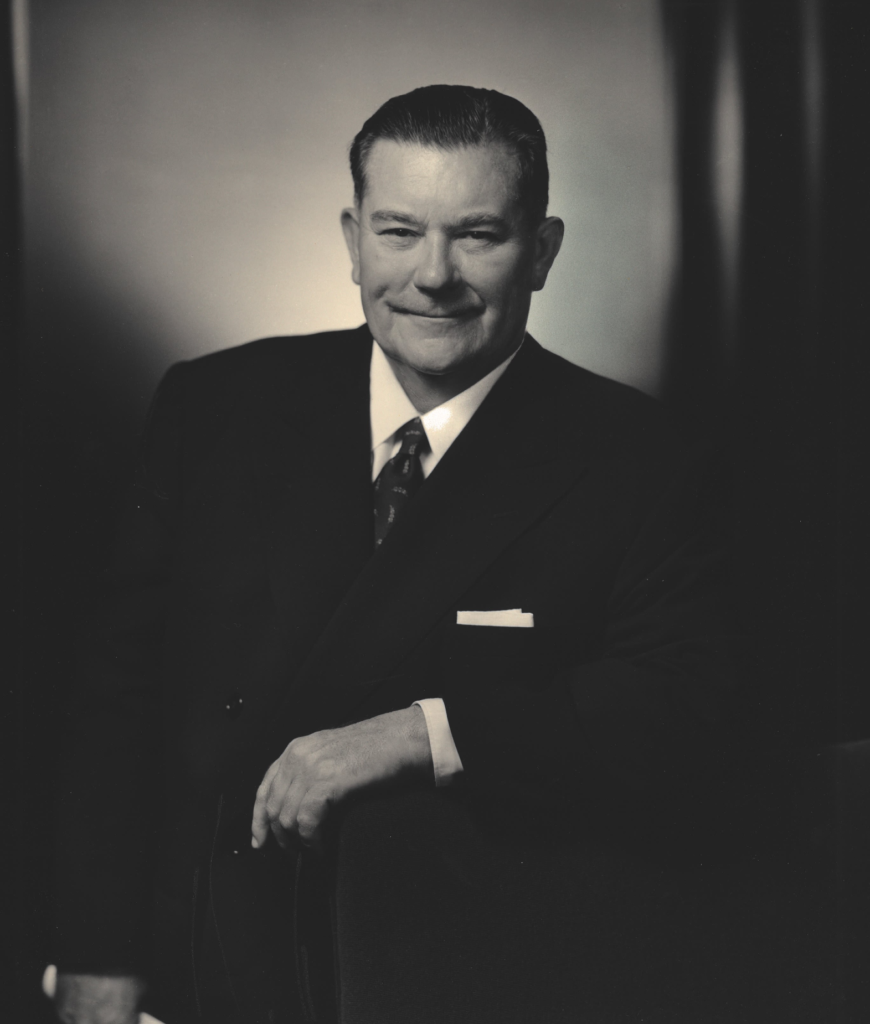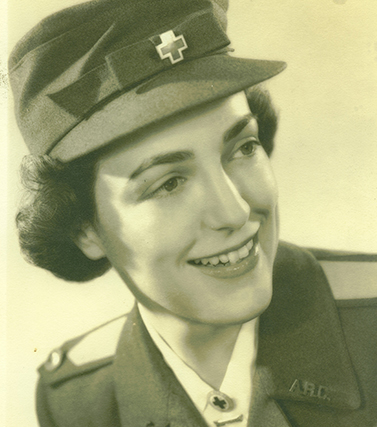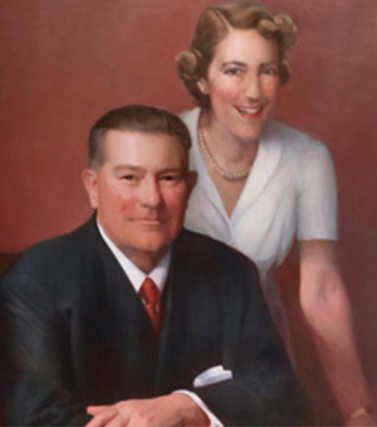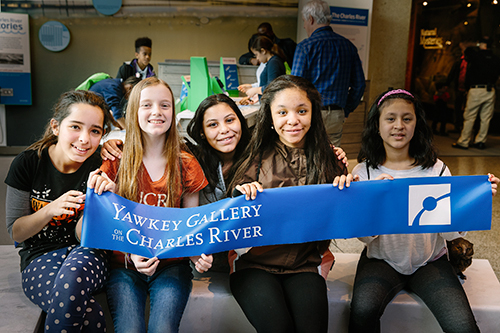Founder of the Yawkey Foundation
Tom Yawkey’s Early Life
Thomas Austin Yawkey was born in 1903 in Detroit, Michigan to Augusta Yawkey and Thomas Austin. When Tom was just seven months old, his father died, and Tom’s mother moved with him and his sister, Anne, to New York City to be near her brother, William “Bill” Yawkey. Tom was raised and educated in the New York City area, but sadly, by the age of 16, both his mother and his Uncle Bill died of the Spanish Flu. Tom was left in the care of guardians and heir to approximately $20 million that had been accumulated by the Yawkey family through lumber, mining, and oil industries throughout the Midwest.
After graduating from boarding school in Tarrytown, New York, Tom continued his education, attending Yale University, where he graduated cum laude in 1925 with a degree in engineering. The experiences and losses during his early life shaped him into a man who deeply valued family, friendships, and loyalty, as well as paved the way for a lifetime dedicated to sharing his vast resources with individuals, families, and communities that he felt could use a helping hand.

A Life Dedicated to Baseball
Boston Red Sox Owner, 1933-1976
In early 1933, right around his 30th birthday, Tom Yawkey purchased the Boston Red Sox. At that time, the Red Sox were among the worst teams in baseball, having a losing record in each of the prior 14 seasons. The team’s home, Fenway Park, although just 20 years old, was rundown and in disrepair due to lack of investment. Tom Yawkey loved the game of baseball and invested heavily in both rebuilding the team and Fenway Park itself, spending a total of $1.5 million on repairs. Tom hired hundreds of workers, laboring around the clock, in order to have Fenway Park ready for opening day in April 1934. The park was essentially rebuilt and remains the oldest ballpark still in continuous operation to this day. He also revitalized the team, bringing on Hall of Famers to both manage and play, and a recruiting system was developed to help find and develop new talent.
Tom’s commitment to the city of Boston, and to providing work opportunities for hundreds of people in the middle of the Great Depression, was widely recognized and praised. He received commendations from many local mayors and governors for his dedication, passion, and investment in making the Boston Red Sox a team that instilled pride in fans and reinvigorated the region. Fenway Park and the Boston Red Sox became two of Boston’s most prized jewels during Tom Yawkey’s four decades as owner and president of the Boston Red Sox, titles he held from 1933 until his passing in 1976.
Tom’s love for baseball did not only extend to the Boston Red Sox. He also began an annual tradition of hosting youth athletes at Fenway Park for baseball clinics and would grant access to the park for local sporting events. He also served as Vice President of the American League of Major League Baseball from 1956 to 1973.
Tom shared a love of baseball with his wife, Jean Yawkey, whom he married in 1944. She took over as owner of the Boston Red Sox after Tom’s passing in 1976. Jean Yawkey also became the first female director of the National Baseball Hall of Fame in 1983.
Induction into the National Baseball Hall of Fame, 1980
For his outstanding contributions to the game of baseball, Tom Yawkey was posthumously inducted into the National Baseball Hall of Fame in 1980. At the time, there were only three other major league team owners in the Hall of Fame.
Former Red Sox player and 1966 Baseball Hall of Fame inductee Ted Williams spoke at Yawkey’s induction ceremony in Cooperstown, NY in July 1980. “Mrs. (Jean) Yawkey asked me to say just a few words about someone that I loved, and above all, he was one of the greatest sportsmen and humanitarians of any era, anywhere,” Williams said of Yawkey.
Yawkey’s plaque in the Baseball Hall of Fame mentions how he set a precedent for the American League, as he was the first owner to have his team travel by plane. Under Tom Yawkey, the Red Sox won the American League pennant in 1946, 1967, and 1975.
A Life Dedicated to Preserving Nature
While Tom Yawkey was indeed passionate about baseball, wildlife and conservation also remained close to his heart. In 1914, Tom’s uncle, Bill Yawkey, purchased a small amount of land along the shoreline in Georgetown County, South Carolina that was part of the South Island Hunting Club. Tom visited Georgetown frequently as a child and developed a great love of the outdoors and wildlife. Upon his uncle’s death, Tom inherited the land, and in 1925, he bought out the surrounding owners for the purposes of preserving the land as a wildlife refuge. Though Tom primarily lived in New York City and Boston, he spent his winters in Georgetown County and developed a great love for the community and its natural resources. Tom was an avid outdoorsman and self-taught ornithologist. He carefully managed the area through his own conservation practices, producing a pristine area reserved for waterfowl, turtles, alligators, and other wildlife. Later on in his life, he hired professional wildlife biologists to assist with the overall management of the property and help him achieve his goal of improving the property for waterfowl and other wildlife.
Upon his death in 1976, Tom bequeathed all of his land to what is now the South Carolina Department of Natural Resources and established the Yawkey Foundation with a perpetual endowment fund to ensure the continued maintenance and upkeep of the vast wildlife preserve. Now encompassing more than 24,000 acres, the Tom Yawkey Wildlife Center is considered one of the most outstanding grants to wildlife conservation efforts in North America. The Tom Yawkey Wildlife Center includes marshes, marine wetlands, forests, and sandy beaches, which play host to hundreds of species of coastal wildlife and serve as an undisturbed habitat for migratory birds, eagles, alligators, and many other endangered species. The Center provides world-renowned research and education programs but is primarily used as a wildlife refuge. Learn more about the Tom Yawkey Wildlife Center on Facebook and Instagram.
A Life Dedicated to Helping Others
Tom Yawkey was known by many as more than just a major league baseball owner and outdoorsman. He also held a reputation as a private and generous man who gave freely of his time and money to people and organizations in need. He often helped people directly with private gifts to support medical care, education, and other expenses – typically with the stipulation that his gifts remain anonymous. He helped establish a much-needed hospital in rural Georgetown, SC in 1945 and quietly supported the early research of a local doctor focused on cancer research, Dr. Sidney Farber. He ultimately designated the Dana-Farber Cancer Institute’s “Jimmy Fund” as the official charity of the Boston Red Sox in 1952. He is also known for paying the college tuition for residents of the Georgetown County community, providing Christmas gifts for children, and building a church in Georgetown County. In Boston, he supported Boston University’s athletics, helped establish the Agganis Foundation, and donated to the JFK Memorial Library, among other things.
With all of this in mind, Tom is fondly remembered by those who knew him best, such as former players, employees, and friends, as a man who lived by his personal motto, “Do what is right. Do it quietly. And don’t expect praise for being kind.” Today, the Yawkey Foundation continues to uphold Tom’s reputation, giving back to the communities that were of the utmost importance to him.

 Red Sox Integration Timeline
Red Sox Integration Timeline 

